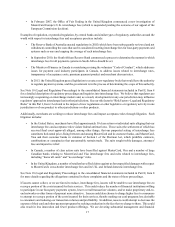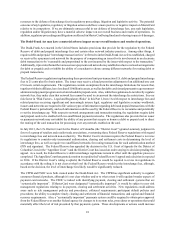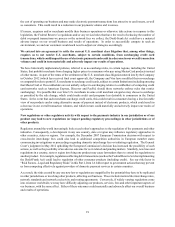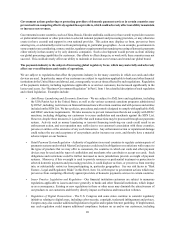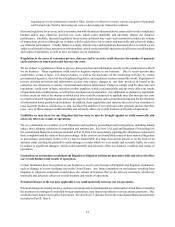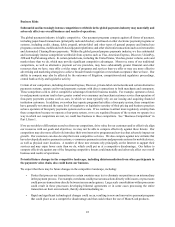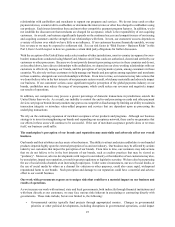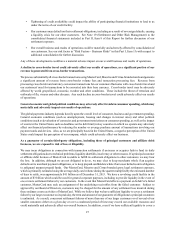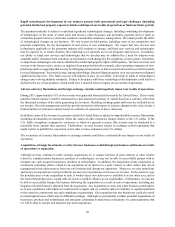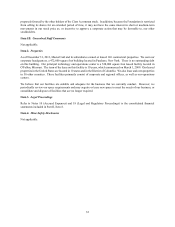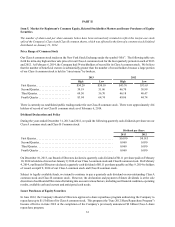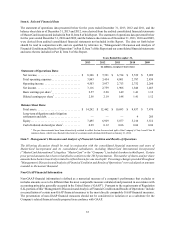MasterCard 2013 Annual Report Download - page 30
Download and view the complete annual report
Please find page 30 of the 2013 MasterCard annual report below. You can navigate through the pages in the report by either clicking on the pages listed below, or by using the keyword search tool below to find specific information within the annual report.26
approved funding and result in changes in the scope, or lead to the termination of, the arrangements or contracts
we or financial institutions enter into with respect to our payment products and services.
• Our work with governments subjects us to U.S. and international anti-corruption laws, including the U.S.
Foreign Corrupt Practices Act and the U.K. Bribery Act. A violation and subsequent judgment or settlement
under these laws could subject us to substantial monetary penalties and damages and have a significant
reputational impact.
• Working or contracting with governments, either directly or via our financial institution customers, can subject
us to heightened reputational risks, including extensive scrutiny and publicity, as well as a potential association
with the policies of a government as a result of a business arrangement with that government. Any negative
publicity or negative association with a government entity, regardless of its accuracy, may adversely affect
our reputation.
Global economic events in financial markets have directly affected, and may continue to affect, many of our
customers, merchants that accept our brands and cardholders who use our brands, which could result in a
material and adverse impact on our overall business and results of operations.
The competitive and evolving nature of the global payments industry provides both challenges to and opportunities for
the continued growth of our business. Adverse economic events (including continued distress in the credit environment,
continued equity market volatility and additional government intervention) have impacted the financial markets around
the world. The economies of the United States and numerous countries around the world have been significantly
impacted by this economic turmoil. Countries have experienced credit ratings actions by rating agencies, including
several in Europe as well as the United States. In addition, some existing customers have been placed in receivership
or administration or have a significant amount of their stock owned by their governments. Many financial institutions
are facing increased regulatory and governmental influence, including potential further changes in laws and regulations.
Many of our financial institution customers, merchants that accept our brands and cardholders who use our brands have
been directly and adversely impacted.
MasterCard's financial results may be negatively impacted by actions taken by individual financial institutions or by
governmental or regulatory bodies. The condition of the economic environment may accelerate the timing of or increase
the impact of risks to our financial performance. Such impact may include, but is not limited to, the following:
• Declining economies, foreign currency fluctuations and the pace of economic recovery can change consumer
spending behaviors, such as cross-border travel patterns, on which a significant portion of our revenues is
dependent.
• Low levels of consumer and business confidence typically associated with recessionary environments and
those markets experiencing relatively high unemployment, may cause decreased spending by cardholders.
• Debt limit and budgetary discussions in the United States could affect the United States’ credit rating and
could affect consumer confidence and spending.
• Our customers may restrict credit lines to cardholders or limit the issuance of new cards to mitigate increasing
cardholder defaults.
• Uncertainty and volatility in the performance of our customers' businesses may make estimates of our revenues,
rebates, incentives and realization of prepaid assets less predictable.
• Our customers may implement cost reduction initiatives that reduce or eliminate payment card marketing or
increase requests for greater incentives or greater cost stability.
• Our customers may decrease spending for value-added services.
• Government intervention, including the effect of laws, regulations and/or government investments in our
customers, may have potential negative effects on our business and our relationships with customers or
otherwise alter their strategic direction away from our products.



